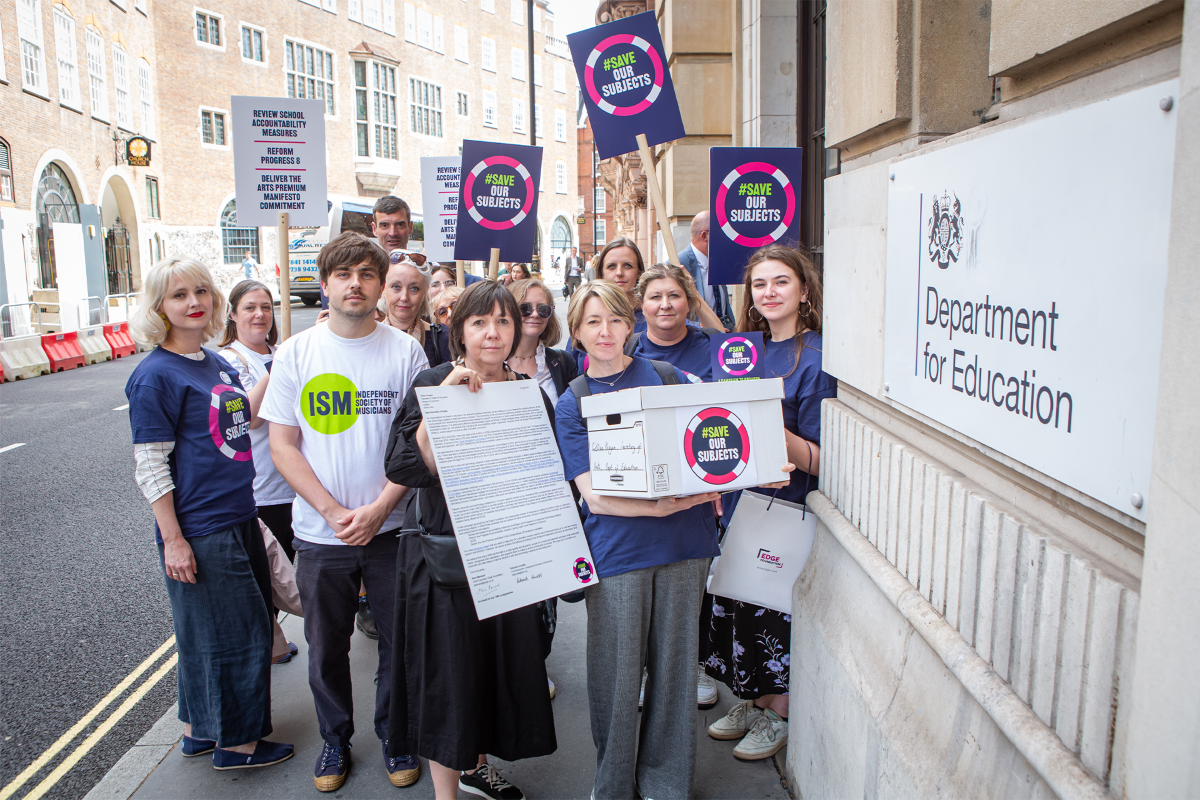
The Independent Society of Musicians has repeatedly warned the Department of Education about the adverse impact of the EBacc
Call for more joined-up thinking in music education
The decimation of arts education has hit the music sector particularly hard. Deborah Annetts of the Independent Society of Musicians calls on government departments to work together to stop the decline.
When young people experience creative subjects, the whole of society and economy benefits. Creative education is essential both for the UK’s world-renowned creative industries, and for a full and joyful life. Sadly, this has not been my experience with the government in recent years, during which time there has been a woeful lack of joined-up thinking. This non-alignment across government policy has harmed creative subjects in schools, with a far-reaching negative impact.
The government’s Build Back Better plan for growth from 2021 identified the creative industries as one of the five sectors where the UK had a competitive advantage, with the Treasury agreeing that the creative industries are at the heart of their growth strategy. And DCMS published its Creative Industries Sector Vision last June, which set out the government’s goals and objectives to deliver growth up to 2030.
But these DCMS plans to grow the creative sector do not align with what is happening in other Whitehall departments, particularly the Department for Education (DfE). For too many years arts subjects have become marginalised in the state sector. As a result, music education has steeply declined and is increasingly less accessible, particularly to students from disadvantaged backgrounds.
British students lack skills for the future
The exclusion of arts subjects from the English Baccalaureate (EBacc) has resulted in a subject hierarchy in schools, with academic subjects prioritised over creative and vocational ones.
In 2019 Andreas Schleicher, the Director of Education and Skills at the Organisation for Economic Co-operation and Development, gave evidence to the Education Select Committee. He talked about the strengths of British students, saying they are better at tasks that “are more associated with the past than the future. The kinds of things that are easy to teach and easy to test are precisely those things that are easy to digitise”.
In his view, the greatest weakness in UK schools is that we are teaching routine cognitive skills and not focusing on non-routine analytic skills, such as problem solving and making judgements.
I agree that creative subjects must be placed at the heart of a child’s education if we are to make the most of the Fourth Industrial Revolution and not become a victim of technological changes.
Requires improvement
As arts subjects have been squeezed out of the curriculum, the uptake at GCSE and A’ level has fallen dramatically. Music GCSE entries have fallen 35% since 2010 and A’ level music entries fell below 5,000 for the first time ever (a 44% decline). This in turn reduces the numbers going on to study music courses at degree level, impacting the number of young adults entering the music sector workforce.
The DfE has been repeatedly warned about the adverse impact of the EBacc, but they choose not to listen. The Lords’ report, Requires improvement: urgent change for 11–16 education, calls on the government to scrap the EBacc and review the secondary school performance measure – Progress 8 – “in light of evidence that the existing measures are failing to support schools to deliver a broad and balanced curriculum”. Frustratingly, it could be abolished almost overnight if the political will were there.
Schools need experienced teachers to lead music education and to mentor, encourage and support less experienced teachers. Targets for secondary music trainees have been consistently missed and the number of secondary music teachers fell 11% between 2011/12 and 2022/23. In 2022/23 recruitment in music reached just 27% of the target.
The government’s current approach is not attracting or retaining teachers. England’s teaching workforce is now one of the youngest in the world as experienced staff are increasingly leaving the profession. DfE figures show that 40,000 teachers – around 9% of the workforce – left teaching early in state schools in 2022, with another 4,000 retiring.
Vital to ensure a talent pipeline
The good intentions of the refreshed National Plan for Music Education are being undermined by accountability measures and stagnant funding. The grant to Music Hubs has increased by just 1% since 2012 (a huge cut in real terms), yet they are being asked to deliver more with less. The less-than-transparent Hub restructure process has also taken time, money and energy away from delivering music to our young people.
The recently announced real-term government cuts to Higher Education courses come in a year of cuts to music at Oxford Brookes and Kent Universities. They are devastating to the institutions impacted, educators, our creative industries and the creatives who want to study.
The 2022 National Plan states: “Higher education and further education institutions are an important part of the overall music education landscape and are vital to ensure a strong talent pipeline into the global music industry.” Delivering real-terms cuts to creative education courses is another example of the misalignment across government departments and sadly it’s our talent pipeline which will be hardest hit in the future.
If we are serious about the creative industries generating growth, then we need joined up thinking across government and policies which deliver, but all too often the Treasury, DfE and DCMS find themselves undermining one another.
Deborah Annetts is Chief Executive of the Independent Society of Musicians.
![]() ism.org
ism.org
![]() @DeborahAnnetts | @ISM_music
@DeborahAnnetts | @ISM_music
Join the Discussion
You must be logged in to post a comment.